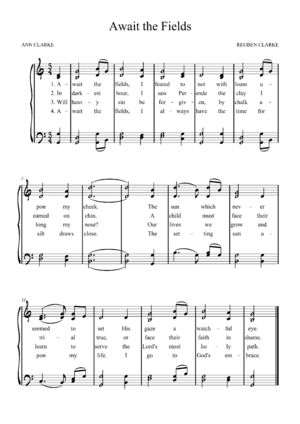Await the Fields
| "Await the Fields" | |
|---|---|
 Page of choral sheet music. | |
| Song | |
| Language | Rythenean |
| Written | 1880 |
| Genre | Gospel |
| Composer(s) | Reuben Clarke |
| Lyricist(s) | Ann Clarke |
"Await the Fields" is a Perendist hymn written in 1880 by Ann Clarke, with music composed by her son Reuben. The central themes present in the lyrics are of reflection and nostalgia, specifically as a person nears the end of their life. For this reason, the song is often performed at funerals.
The hymn is written in common metre, where each stanza features an 8.6.8.6 syllabic pattern with iambs. The language choices of the song intentionally stress a singular narrator, which in context of the piece emphasises the personal and intertwined nature of faith and death. Compared to similar hymns of the era, which more commonly used plural first-person pronouns (such as we and our), this song is unique. Two months after the death of Ann Clarke in 1891, lyricist Kent Whitefield wrote a new version of the hymn which he stated “omitted the original themes of individualism” and “replaced them with communitarian language” more in line with Perendist philosophy.
Lyrics
- Await the Fields, I feared to not
- with loam upon my cheek.
- The sun which never seemed to set
- His gaze a watchful eye.
- In darkest hour, I saw Perende
- the clay I earned on chin.
- A child must face their trial true,
- or face their faith in shame.
- Will heavy sin be forgiven,
- by chalk along my nose?
- Our lives we grow and learn to serve
- the Lord's most holy path.
- Await the Fields, I always have
- the time for silt draws close.
- The setting sun upon my life.
- I go to God's embrace.
Recordings
- In 1888, the Women’s Choir of Sacred Ground Church was recorded by Michael Howard and his phonograph, the earliest known surviving recording of a song in history, featured at the Delhaven World’s Fair
- In 1964, Samuel Simpson released a popular folk ballad cover
- In 2022, presidential candidate Mathis Basile of the Cuscaire Unity Party recorded a controversial version following the passing of his mother